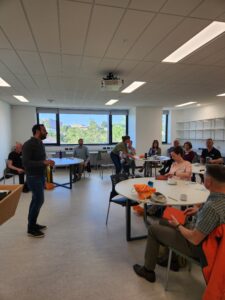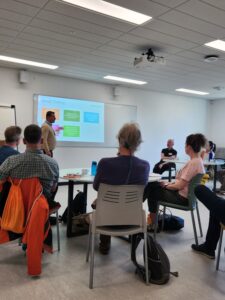Sligo Living Lab Workshop Fosters Collaborative Solutions to Local Climate Challenges
Sligo, Ireland – September 5, 2024. – The Sligo Living Lab successfully hosted its first workshop of 2024, bringing together local stakeholders to co-design innovative solutions for the region’s most pressing climate challenges. The workshop, part of PRO-CLIMATE project, marks another milestone in the lab’s three-year history of collaborative efforts to address climate hazards in the Sligo region.
A Collaborative Approach to Climate Action
The Sligo Living Lab has been an essential platform for engaging the local community in climate action. Over the past three years, the lab has facilitated co-creation and co-design processes aimed at developing nature-based solutions to combat the effects of climate change. This workshop continued the lab’s tradition of community-driven innovation by focusing on actionable solutions for previously identified climate hazards.
During the event, participants engaged in a structured design sprint to explore and analyze various climate scenarios. Split into four groups, participants worked collaboratively to identify and prioritize potential solutions, ultimately presenting their results in concise presentations. The workshop, which featured 20 stakeholders from various sectors, highlighted the importance of local input in tackling regional environmental issues.
 Dr. Salem Gharbia, coordinating the work of the Atlantic Technological University (ATU) in PRO-CLIMATE, opened the workshop with an inspiring address on the importance of collective action and local engagement. In his speech, Dr. Gharbia emphasized the critical role that community-driven initiatives like the Sligo Living Lab play in developing solutions to combat climate change:
Dr. Salem Gharbia, coordinating the work of the Atlantic Technological University (ATU) in PRO-CLIMATE, opened the workshop with an inspiring address on the importance of collective action and local engagement. In his speech, Dr. Gharbia emphasized the critical role that community-driven initiatives like the Sligo Living Lab play in developing solutions to combat climate change:
“Today’s workshop is another step towards building a resilient community that is equipped to face the climate challenges of tomorrow. The PRO-CLIMATE project believes in the power of collaboration, and we are proud to see stakeholders from different sectors come together to contribute to this shared goal. Our work is not just about identifying problems, but actively designing solutions that will make a real difference in the lives of people here in Sligo and beyond.”
Gharbia also acknowledged the need for broader stakeholder representation, stating that “moving forward, we will continue to expand our reach and ensure that all voices are heard—whether it’s farmers, students, or local businesses—because climate change affects us all.”
Key Outcomes and Next Steps
 The workshop’s collaborative design sprint generated valuable data that will inform the lab’s ongoing efforts. Facilitators from the Sligo Living Lab research team guided the discussions, ensuring productive dialogue and engagement from all participants. Although the session provided meaningful insights, the workshop also revealed areas for improvement, such as the need for better stakeholder representation, including farmers, students, and insurance companies.
The workshop’s collaborative design sprint generated valuable data that will inform the lab’s ongoing efforts. Facilitators from the Sligo Living Lab research team guided the discussions, ensuring productive dialogue and engagement from all participants. Although the session provided meaningful insights, the workshop also revealed areas for improvement, such as the need for better stakeholder representation, including farmers, students, and insurance companies.
Moving forward, the Sligo Living Lab team will analyze the data collected during the workshop and incorporate feedback to refine future sessions. The results will be shared with workshop participants and the wider community, with plans already in place for a second workshop in the coming months.
Challenges and Opportunities
While the workshop was a success, the lab acknowledges some limitations in its structure. The need for a more balanced representation of stakeholders, as well as better coordination with other project work packages (WPLs), was identified as key areas for future improvement. Despite these challenges, the Living Lab team remains optimistic about the ongoing process and the opportunities for growth and collaboration moving forward.
About Sligo Living Lab
The Sligo Living Lab is part of the larger PRO-CLIMATE initiative, aimed at developing community-driven, nature-based solutions to local climate challenges. The lab has been operational for three years, engaging local stakeholders in a co-creative process to design innovative solutions that address the region’s specific environmental hazards. For more information about the lab and its ongoing projects, visit the SCORE project’s official website.
